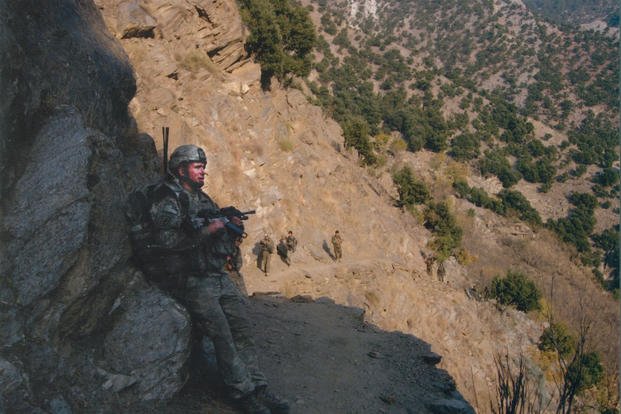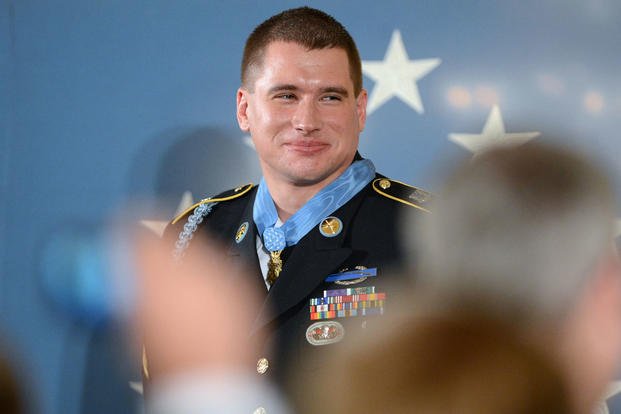Kyle White is a former Army sergeant and the 7th living recipient of the Medal of Honor from Operation Enduring Freedom. Follow him on Twitter @officialkwhite or on Instagram @Kylejwhiteofficial.
A day 13 years in the past can seem like both yesterday and a lifetime ago. At least, this is how it feels looking back to Nov. 9, 2007.
What happened that afternoon on a rocky hillside in Nuristan Province, Afghanistan, would change the lives of everyone who fought there, as well as the families of those who would make the ultimate sacrifice in the defense of our country.
It was the worst day of my life, and it would be followed by many hard years caught in an endless battle inside my head. I would need to learn to rely on others and change my thinking to move forward and live out the second chance at life I was given.
Thirteen years ago today, my patrol of 14 Americans was ambushed in “perfect” conditions -- at least, from the enemy’s point of view. They hit us from multiple sides at the same time as we were crossing a dangerous area due to the steep terrain and lack of cover that was surrounding us and our patrol’s movement.

By most accounts, it was a beautiful fall day. Spirits had been high as we were returning from an overnight mission in a small nearby town called Aranas. The sun had begun to set just as it did the day before, beautiful and warm, but also perfectly concealing the enemy’s positions while we were moving to the ambush site.
What started off as a few shots echoing in the valley quickly turned into hell on the hillside. The fight was intense and brutal.
There were incredible stories of bravery from every member of the patrol, as well as other friendly elements in nearby positions that were simultaneously attacked. The enemy was organized and well-trained. They planned for this day and these few hours. What they did not account for was Chosen Company, 2nd Battalion (Airborne), 503rd Infantry Regiment, 173rd Airborne Brigade. We trained for this exact moment and worked as a team to ensure the day was won, no matter the cost -- with vital support from mortars, artillery and air.
In the end, there were six American heroes that gave everything they had that day. I lost my best friend, Cpl. Sean Langevin, and will always remember the last words I said to him as he rounded that corner on the trail -- though I’ll keep those words between us.
I would never see him again. Looking back, I feel lucky that we got cut off from one another during the fight. My last memory of my friend was of him smiling and looking back at me as we teased each other. In many ways, I suppose that was a fitting goodbye.

That day, with its pain, loss and trauma, would shape the rest of my life. Afterward, I hated my daily routine. I hated the constant play-by-play review I would run through in my head about the choices I could have or should have made. It was an endless cycle, and it shaped me into a bitter and angry person. I blamed myself for my actions and what I felt I should have done differently. I took it out on those around me, and it cost me relationships in my unit and elsewhere for years after.
What I should have done was raise my hand and ask for the help I needed. I was prideful and afraid -- afraid of what others would think and of what I might learn about myself in the process.
I received the Medal of Honor at the White House on May 14, 2014. But after that event, I feel I took a major step backward. I closed everyone off and tried to pretend like my new path forward in life did not exist. I wanted to be forgotten. I wanted to be anonymous. I wanted what other people seemed to have and that I desperately wanted: a normal life. This again came with a steep cost. I lost friends, and I lost one of my support groups. I lost a lot of who I had become in the years since I had first put on the uniform.
In the years that passed, I did finally decide to get help, and it was the best decision I have ever made. I realized quickly that fixating on what others thought of me was hurting my health and stopping me from moving forward. I went to a lot of therapy and, although I hated parts of it, it helped me to start feeling human again. If I were to go back in time, I probably would have shared more and continued treatment. I see now that the emotional unavailability that I utilized as a coping mechanism had become a stubborn part of my psyche that I still work to modify.
My wife helped me gradually become more open to the world around me as the years passed. And I have come to believe a few things that have helped me live more freely.
One is that there is no changing what happens in war. There is only what happens and what we choose to do when we are called upon to act. There is no point in agonizing about what actions could have saved lives and what could have altered today’s reality. This is not a realization that came quickly, but one I reached over time.
Time is supposed to aid in the healing process and, while I don’t believe that is completely true, I do believe it changes our perception of what we have experienced and how we choose to live with it. I have grown as a person and have tried to make peace with the events that transpired in Afghanistan and acknowledge that those moments are not the defining point for the rest of my life. They have merely shaped who I am, and it is now up to me to write the next chapters.
I am in control of the path I take and what I choose to do as a father, husband and Medal of Honor recipient. I am blessed to have a great support group in my circle, but especially at home. My amazing wife has helped guide me over the years on this healing journey; I know she will continue that role for the rest of our lives. Becoming a father also contributed significantly to this process: I want to be certain that when the time comes to discuss my prior service with my children, and talk about those I served with, that I am able to speak to it with the right mindset.
What is important to realize about combat, and military service in general, is that while all experiences vary, all experiences are necessary. We are one team engaged in the same fight to secure our nation and protect our way of life. It is even more important to realize that your entire life should not be shaped by one bad experience, bad day or even bad year, as 2020 has taught us. We must learn what we can along the way and challenge ourselves to do better. We must do better for ourselves, our families and our communities.
Today, when I look back on these 13 years that have passed, I look back with gratitude. There are times I am not proud of and other times that I am. I am thankful because life is good -- damn good.
I have been given a second chance at this life, and I intend to make the most of it. Having been a Medal of Honor recipient for more than six years now, I am beginning to truly realize what it means to me and to others to wear the medal. I am beginning to see what my purpose is, and what I must do in the future.
I must support our nation’s veterans and their families. I must do the same for those who are actively serving in the armed forces. I do this because it is those groups for whom I wear the medal. I am not merely a recipient, but a custodian guarding a specific moment in our nation’s proud military history.
Most importantly, I wear the medal for those six heroes who made the ultimate sacrifice that day in November: a moment that still feels both yesterday and a lifetime ago.
-- The opinions expressed in this op-ed are those of the author and do not necessarily reflect the views of Military.com. If you would like to submit your own commentary, please send your article to opinions@military.com for consideration.











